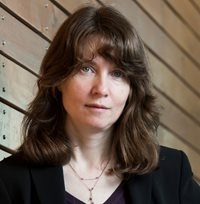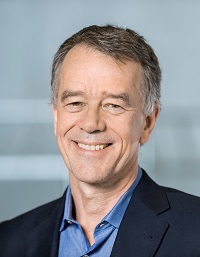Elevating the tireless work of MS researchers will lead to cures for MS. The Barancik Prize and Dystel Prize honor scientists whose revolutionary approaches are improving the lives of people living with multiple sclerosis. We are inspired to share the revolutionary contributions of Dr. Ruth Ann Marrie and Dr. Roland Martin.
Barancik Prize Winner, Dr. Ruth Ann Marrie
 The Barancik Prize awards original, cutting-edge scientific MS research and focuses on the potential of the work to result in pathways for treatment and cures for MS. The Society is pleased to honor Dr. Ruth Ann Marrie with this honor for her focus on deepening understanding of how and when MS evolves.
The Barancik Prize awards original, cutting-edge scientific MS research and focuses on the potential of the work to result in pathways for treatment and cures for MS. The Society is pleased to honor Dr. Ruth Ann Marrie with this honor for her focus on deepening understanding of how and when MS evolves.
Dr. Marrie’s research takes a holistic approach to understand how MS affects individuals in the context of their unique lifetime experiences and exposures, which may include:
- adverse childhood experiences
- social circumstances
- comorbidities (other disorders along with MS)
- health behaviors
- and other factors.
Understanding how different factors impact the onset and evolution of MS may offer new avenues for personalized approaches to stopping MS and for finding ways to prevent it.
Among her many contributions:
- Comorbidities can make MS worse: The impact of comorbidities had not been meaningfully explored in MS before Dr. Marrie began her work. In 2010, she published the first report suggesting that comorbidities such as diabetes, high blood pressure, heart disease and high cholesterol could increase disability and progression in people with MS. Her team has since shown that various comorbidities affect all aspects of MS including time to diagnosis, severity of disability at diagnosis, the use of health care, relapse rates and mortality.
This work raises the possibility that addressing other health conditions may reduce the impacts of MS as well. Her findings have informed treatment guidelines by the American Academy of Neurology, the Canadian Network of MS Clinics, and the international MS Brain Health group.
Dr. Marrie broke new ground in 2012 with the publication of a landmark paper showing that people with MS increased their use of healthcare (doctor visits) during the five years before their first symptoms of MS occurred. This and additional work by her team led to the recognition that MS has a “prodrome,” an early phase of unspecific symptoms indicating a high risk for future diagnosis of MS. Further work to map out the prodrome may enable opportunities to intervene and prevent the development of full-blown MS.
Dr. Marrie is also a coauthor of the Pathways to MS Cures Roadmap that outlines the most promising research to stop MS, restore function, and end MS by prevention. She played a key role in the National MS Society’s MS Prevalence Initiative, in which leading experts developed a feasible estimate of the number of people living with MS in the U.S. They showed that nearly 1 million people are living with MS in the U.S. – more than twice the previous estimate.
The Barancik Prize is presented by the National MS Society and made possible through the incredible generosity of the Charles and Margery Barancik Foundation. Read more about past Barancik prize honorees.
Dystel Prize Winner, Dr. Roland Martin
 The John Dystel Prize for MS Research is awarded collaboratively by the National MS Society and the American Academy of Neurology, and recognizes exceptional contributions to research in the understanding, treatment, or prevention of MS. This year’s winner is Dr. Roland Martin from University Zurich and University Hospital Zurich, in Zurich, Switzerland. He is being honored for advancing our understanding of immune mechanisms underlying multiple sclerosis and translating them to develop innovative strategies to treat the disease.
The John Dystel Prize for MS Research is awarded collaboratively by the National MS Society and the American Academy of Neurology, and recognizes exceptional contributions to research in the understanding, treatment, or prevention of MS. This year’s winner is Dr. Roland Martin from University Zurich and University Hospital Zurich, in Zurich, Switzerland. He is being honored for advancing our understanding of immune mechanisms underlying multiple sclerosis and translating them to develop innovative strategies to treat the disease.
Dr. Martin uncovered how key MS susceptibility genes are involved in launching immune attacks on the nervous system and identified specific components of nerve-insulating myelin that are targeted by those attacks. His team has developed an experimental therapy designed to make the immune system ignore those targets but leave the rest of the protective immune system intact. This strategy is now in clinical testing.
Dr. Martin’s work has revealed how immune B cells play a role in activating immune T cells to enter the brain and spinal cord and target specific tissue components in MS and has offered clues to how infectious agents or gut bacteria could trigger MS immune attacks. He has also provided care for people with MS throughout his career, has conducted early clinical trials testing novel therapies in MS, and was responsible for making aHSCT available in Switzerland for people with active MS.
The Dystel Prize is facilitated through a special contribution from the John Dystel Multiple Sclerosis Research Fund at the National MS Society since 1995. Read more about past Dystel Prize honorees.